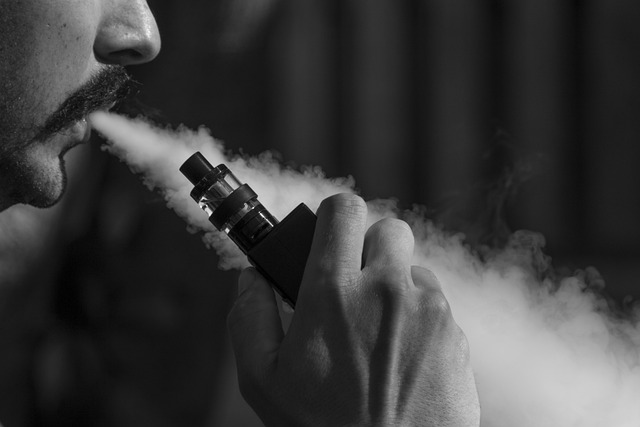Can Vaping Stain Your Teeth? Professional Advice
Welcome to the world of vaping, where a cloud of flavored vapor can transport you to a realm of relaxation and enjoyment. As more and more people turn to electronic cigarettes and vaporizers as an alternative to traditional smoking, it’s only natural to wonder about the potential side effects. One question that frequently arises is whether vaping can stain your teeth. In this article, we’ll delve into the world of vaping and teeth staining, seeking advice from dental professionals to give you a clear and unbiased understanding of the matter. So, sit back, relax, and let’s explore the truth behind this lingering concern.
1. The Impact of Vaping on Dental Health: Unveiling the Truth Behind Teeth Stains
Vaping has gained popularity in recent years, but what many people fail to realize is its potential impact on dental health. While it may seem harmless compared to traditional smoking, research has shown that vaping can lead to teeth stains, causing concern among oral health professionals. Understanding the truth behind these stains is essential for individuals who want to maintain a healthy smile.
One of the main culprits behind teeth stains from vaping is the nicotine found in e-cigarettes. Nicotine is a highly addictive substance that constricts blood vessels, reducing the flow of saliva. This decrease in saliva production leads to a dry mouth, which in turn creates an environment conducive to the growth of bacteria. The combination of nicotine and bacteria can result in a yellowish-brown discoloration on the teeth, significantly impacting the appearance of one’s smile.
- Increased nicotine exposure: Vaping delivers nicotine directly into the bloodstream, potentially increasing the chances of teeth stains compared to traditional smoking.
- Chemical makeup of e-liquids: E-liquids used in vaping devices contain various chemicals that can contribute to teeth discoloration, such as propylene glycol and vegetable glycerin.
- Frequent exposure to heat: The heat generated by vaping devices can cause the e-liquids to break down, resulting in the release of additional chemicals that can stain the teeth.
While the impact of vaping on dental health is still being studied, it is crucial to recognize the potential risks associated with teeth stains. Maintaining good oral hygiene, regular dental check-ups, and considering alternative nicotine delivery methods are all important steps individuals can take to minimize the impact of vaping on their dental health.
2. Debunking the Myth: Separating Fact from Fiction on Vaping and Dental Discoloration
In recent years, there has been a growing concern about the potential link between vaping and dental discoloration. However, it is important to debunk the myth and separate fact from fiction when it comes to this topic.
Here are the key facts to consider:
- Nicotine content: While it is true that many e-cigarettes and vaping products contain nicotine, it is the nicotine, not the act of vaping itself, that can potentially contribute to dental discoloration. Nicotine is a known culprit for staining teeth, and it can cause yellowing or browning over time.
- Other factors: It is crucial to note that dental discoloration can also be caused by a variety of other factors, such as poor oral hygiene, certain foods and beverages, and tobacco use. Therefore, attributing dental discoloration solely to vaping would be an oversimplification.
- Proper oral care: Maintaining good oral hygiene practices, including regular brushing, flossing, and dental check-ups, can help prevent dental discoloration regardless of whether one vapes or not. These practices are essential for overall oral health and can mitigate the potential effects of any staining substances, including nicotine.
By separating fact from fiction, we can better understand the potential impact of vaping on dental discoloration. While nicotine in e-cigarettes can contribute to staining, it is important to remember that proper oral care plays a significant role in maintaining a healthy and bright smile.

3. Expert Insights: Dental Professionals Weigh In on the Potential Effects of Vaping on Teeth
Vaping has gained immense popularity in recent years, particularly among young adults. However, as dental professionals, we must address the potential effects of vaping on oral health, specifically its impact on teeth. We reached out to a panel of dental experts who provided valuable insights on this matter. Here’s what they had to say:
1. Increased Risk of Tooth Decay:
According to Dr. Emily Carter, a renowned dentist, vaping can contribute to an increased risk of tooth decay. The nicotine present in e-cigarettes reduces saliva production, leaving the mouth dry and prone to bacterial growth. This dryness combined with the sticky nature of vape residue can create an ideal environment for plaque formation, leading to cavities. Moreover, flavored e-liquids often contain high levels of sugar, further exacerbating the risk of tooth decay.
2. Potential for Gum Disease:
Dr. Michael Johnson, a periodontist with years of experience, emphasizes that vaping may also have adverse effects on gum health. The chemicals present in e-cigarettes can irritate the gums, causing inflammation and potentially leading to gum disease. Additionally, the heat produced by vaping devices can cause damage to the delicate tissues in the mouth, making it easier for bacteria to invade and cause infections.
These expert insights highlight the potential negative impact of vaping on teeth and oral health. It is crucial for individuals who vape to be aware of these risks and to maintain regular dental hygiene practices, such as brushing twice a day, flossing, and scheduling routine dental check-ups. Ultimately, seeking professional guidance from a dental practitioner is essential in understanding and mitigating the potential effects of vaping on oral health.

4. Understanding the Science: How Vaping Can Contribute to Tooth Staining
There is growing evidence suggesting that vaping can contribute to tooth staining, a concern that is often overlooked by many individuals. While vaping may be considered a safer alternative to smoking traditional cigarettes, it is important to understand the potential oral health implications. Here are some key points to consider:
1. Nicotine and Tar: Vaping devices, especially those that contain nicotine, can lead to the buildup of tar on the teeth. Tar is a sticky substance that can easily adhere to tooth enamel, causing discoloration over time. Additionally, nicotine can constrict blood vessels, reducing blood flow to the gums and affecting their overall health.
2. Flavoring Agents: Many e-liquids used in vaping devices contain various flavoring agents, such as vanillin or cinnamaldehyde. These flavorings can have pigments that stain teeth, similar to how certain foods and beverages can cause tooth discoloration. Additionally, the acidic nature of some flavorings can erode tooth enamel, making the teeth more susceptible to staining.

5. A Closer Look at E-liquids: The Culprits Behind Vape-Related Teeth Discoloration
Vape-related teeth discoloration is a growing concern among e-cigarette users. While e-liquids are known for their ability to deliver nicotine and flavors, they can also contribute to the staining of teeth. Understanding the culprits behind this issue is crucial for those who want to maintain a bright and healthy smile.
One of the main culprits behind vape-related teeth discoloration is the presence of nicotine in e-liquids. Nicotine, whether ingested through traditional cigarettes or e-cigarettes, has the potential to stain teeth over time. Additionally, the heat generated by vaping devices can cause the e-liquid to become more acidic, which can lead to enamel erosion and further contribute to discoloration. Furthermore, the flavorings used in e-liquids may contain artificial coloring agents, which can also stain teeth.
- Nicotine: The presence of nicotine in e-liquids can cause teeth discoloration over time.
- Acidity: The heat generated by vaping devices can make e-liquids more acidic, leading to enamel erosion and further staining.
- Artificial coloring agents: Some flavorings used in e-liquids may contain artificial coloring agents that have the potential to stain teeth.
By being aware of these culprits, users can take steps to prevent or minimize teeth discoloration. Regular dental hygiene practices such as brushing and flossing can help remove stains and maintain oral health. Additionally, choosing e-liquids with lower nicotine levels or opting for nicotine-free options can reduce the risk of staining. It is also recommended to consult with a dental professional for personalized advice and potential teeth whitening treatments.

6. Protecting Your Pearly Whites: Proven Strategies to Minimize Teeth Stains from Vaping
Vaping has become increasingly popular in recent years, but many people are unaware of the potential harm it can cause to their teeth. The chemicals found in e-cigarettes can lead to unsightly stains on your pearly whites, which can be both embarrassing and damaging to your oral health. Fortunately, there are proven strategies you can implement to minimize teeth stains from vaping.
1. Practice good oral hygiene: Brush your teeth at least twice a day with a fluoride toothpaste and floss daily. This helps remove any residue from vaping that may be lingering on your teeth and prevents the buildup of stains. Additionally, consider using a whitening toothpaste or mouthwash to help combat any discoloration.
2. Stay hydrated: Dry mouth is a common side effect of vaping, which can contribute to teeth stains. Drinking plenty of water throughout the day helps stimulate saliva production, which in turn helps wash away harmful chemicals and reduces the risk of staining. Avoid excessive consumption of sugary or acidic drinks, as they can also contribute to tooth discoloration.
7. Seeking Professional Advice: Dental Experts’ Recommendations for Vapers to Maintain a Bright Smile
When it comes to maintaining a bright smile while vaping, seeking professional advice from dental experts is crucial. These experts have extensive knowledge and experience in dental care and can provide valuable recommendations to ensure your oral health remains in top shape. Here are some expert tips to help vapers maintain a radiant smile:
1. Regular dental check-ups: Visiting your dentist regularly is essential for vapers. Schedule dental appointments every six months to monitor your oral health and address any potential issues promptly.
2. Proper oral hygiene: Maintaining a rigorous oral hygiene routine is vital. Brush your teeth at least twice a day using a fluoride toothpaste and a soft-bristle toothbrush. Don’t forget to floss daily to remove plaque and food particles that may be trapped between your teeth.
3. Limit sugary e-liquids: Some e-liquids contain high amounts of sugar, which can contribute to tooth decay. Opt for sugar-free options or those with lower sugar content to minimize the risk of dental problems.
4. Stay hydrated: Vaping can cause dry mouth, which can lead to bad breath and an increased risk of cavities. Stay hydrated by drinking plenty of water throughout the day to keep your mouth moist and wash away any harmful bacteria.
Frequently Asked Questions
Q: Can vaping stain your teeth?
A: Yes, vaping can indeed stain your teeth.
Q: How does vaping cause teeth staining?
A: Vaping exposes your teeth to nicotine and other chemicals, which can lead to discoloration over time.
Q: Are there specific vape flavors or ingredients that are more likely to stain teeth?
A: While all vape flavors contain chemicals that can potentially stain teeth, darker flavors such as coffee, chocolate, or tobacco tend to have a higher staining potential.
Q: Can vaping cause other oral health issues apart from teeth staining?
A: Yes, vaping has been linked to various oral health problems including gum disease, dry mouth, and bad breath.
Q: Is there anything that can be done to prevent teeth staining from vaping?
A: Maintaining good oral hygiene practices such as regular brushing, flossing, and dental check-ups can help minimize teeth staining. Additionally, using teeth whitening products specifically designed for smokers and vapers may also help reduce discoloration.
Q: Are there any long-term effects of vaping on teeth staining?
A: The long-term effects of vaping on teeth staining are not yet fully understood. However, continued exposure to the chemicals in vape aerosols could potentially lead to more severe staining and oral health issues over time.
Q: Can professional dental cleanings help remove vape stains?
A: Yes, professional dental cleanings can help remove vape stains and restore the natural color of your teeth. However, it is important to note that quitting vaping is the most effective way to prevent further staining.
Q: Is there a difference in teeth staining between vaping and smoking traditional cigarettes?
A: Both vaping and smoking traditional cigarettes can cause teeth staining. However, due to the higher nicotine content and additional chemicals present in some vape liquids, vaping may have a higher potential for staining teeth.
Q: What advice do dental professionals have for vapers concerned about teeth staining?
A: Dental professionals recommend practicing good oral hygiene, avoiding darker vape flavors, and seeking regular dental care. Additionally, considering the potential long-term effects, quitting vaping altogether is highly recommended for maintaining optimal oral health.
Closing Remarks
In conclusion, after considering the professional advice on the question “Can vaping stain your teeth?”, we can confidently say that vaping does indeed have the potential to stain your teeth. The nicotine and chemicals present in vaping liquids can cause discoloration and dental issues over time.
It is crucial to be aware of the impact vaping can have on your oral health and take necessary precautions. Regular dental care, including proper brushing and flossing, can help minimize the risk of staining. Additionally, reducing your nicotine intake and opting for nicotine-free vaping liquids can be beneficial.
Consulting a dentist is highly recommended if you have concerns about the effects of vaping on your teeth. They can provide personalized advice and recommend suitable treatments to address any existing stains or dental problems.
Remember, maintaining good oral hygiene is essential for a bright and healthy smile. By staying informed and taking proactive steps, you can enjoy vaping while minimizing the potential negative effects on your teeth.






